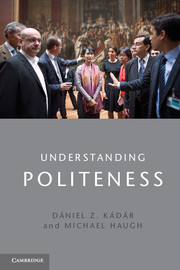Book contents
- Frontmatter
- Contents
- List of figures
- List of tables
- Foreword
- Acknowledgements
- 1 Introduction
- Part I Theoretical framework
- Part II Politeness and time
- Part III Politeness and social space: from mind to society
- 9 Politeness and metapragmatics
- 10 Politeness, cognition and emotion
- 11 Culture, identity and politeness
- 12 Conclusion
- Notes
- Glossary
- References
- Index
12 - Conclusion
Published online by Cambridge University Press: 05 June 2014
- Frontmatter
- Contents
- List of figures
- List of tables
- Foreword
- Acknowledgements
- 1 Introduction
- Part I Theoretical framework
- Part II Politeness and time
- Part III Politeness and social space: from mind to society
- 9 Politeness and metapragmatics
- 10 Politeness, cognition and emotion
- 11 Culture, identity and politeness
- 12 Conclusion
- Notes
- Glossary
- References
- Index
Summary
Politeness as social practice
If we were to ask someone what they think politeness is, they might mention things such as remembering to say ‘please’ and ‘thank you’ (e.g. in many varieties of English), using honorifics (e.g. in Japanese), or calling people by familial titles when greeting them (e.g. in Chinese). However, it is now widely accepted that politeness does not reside in particular linguistic forms or behaviours, but rather in evaluations of those forms and behaviours. In this volume, we have taken this idea a step further and proposed that politeness arises through evaluations of social actions and meanings. Social actions and meanings are recognisable to us because they draw on practices, regular or recurrent ways of formulating talk and conduct that are understood by participants as doing and meaning certain things. These regular ways of accomplishing social actions and meanings in interaction are constituted as part of what we take for granted in interacting with others. What is particular about these sets of expectancies is that because they are the means by which we constitute the familiar scenes of everyday life as familiar and everyday, they are inherently moral in nature. In other words, they are open to evaluation as good or bad, appropriate or inappropriate, and, of course, polite, overpolite, not polite, mock polite, impolite, not impolite, mock impolite and so on. Evaluations of politeness are thus not idiosyncratic but rooted in a moral order. It is in this sense that politeness can ultimately be understood as a form of social practice.
- Type
- Chapter
- Information
- Understanding Politeness , pp. 251 - 258Publisher: Cambridge University PressPrint publication year: 2013



